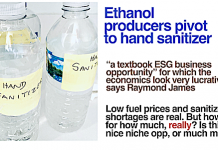Jim Lane 
Leading a series this week, “The Strategics Speak”, in which we’ll look at what a number of major strategic investors see in the landscape relating to industrial, energy and agricultural investment, Biofuels Digest visited with Dan Oh, CEO of Renewable Energy Group (REGI), which has long been the US’s leading independent biodiesel producer but in recent years has steadily diversified and expanded operations.
In many ways, REG is the entire industrial biotech business in a nutshelll. They’re fermentation (through REG Life Sciences), and thermocatalytic (through REG Geismar and their extensive biodiesel business). They use both sugars and lipids as feedstocks. They make both biodiesel and drop-in renewable diesel. They make fuels and an array of chemicals. They’re in the distribution and blending business distributing their fuels blended with traditional fossil distillates. They have multiple plants and labs in the West, Midwest and Eastern sections of the country. They’re deep into some of the most exotic commercial synthetic biology out there.
In other ways, they achieve what others aspire to. Multi-feedstock, multi-product it’s a reality, not a goal. Publicly traded after a successful IPO a reality. Generating substantial cash flow a reality. And don’t let the “aw, shucks” demeanor fool you for a moment if they don’t “talk the talk” with the hyperbole of Silicon Valley, they “walk the walk” when it comes to building capacity, building revenues, and building reputation.
 The Digest: The company has substantially diversified, in recent years, let’s start there.
The Digest: The company has substantially diversified, in recent years, let’s start there.
Oh: That journey started in a practical sense in 2010, although we’ve always planned to be a broad energy & chemicals company. We’re grounded as a team in the lessons and disciplines of commodity agriculture, so we knew that we had to have to have a lot of options, more than just one raw material choice, adaptable technology, and many different products out of that.
So, we started with one feedstock and expand across the lipid spectrum, and in 2010 we started targeting other chemicals and fuels, beginning of a long we’ve of diversification. To date, we’ve invested almost $300m in diversification.
Lipids are a worldwide business as are sugars, and we are looking for base platforms that wecan grow and adapt, with a focus on the distillate area and the intermediate speciality chemicals. Right now, we’re building out biomass based diesel across North America, and ultimately taking it international, based on fundamental internal growth, M&A,plus technology upgrading and innovation. We’re generating great cash flow from advanced biofuels, and we have array of technology options out there, so we have got so many good choices that it is almost about what you’re not going to do rather than what you’re going to do.
The Digest: After a successful IPO, you now find yourself in a leading position when it comes to dialogue with Wall Street about industrial biotech. How do you talk about these advanced technologies there?
Oh: Money’s not brave. Wall Street want to see profitable companies, they want to see the downside protected and lots of upside. In our case, we are building an industrial business that happens to be green, and I think we’re getting credibility as an industrial company, with strong balance sheet, and looking backwards, over 100M in EBITDA each year on average. Our strategy is born from practical needs and experience, in the end, you’ve got to run a business, and be subject to standard finance practice just like everyone else, and let’s face it, all companies have a hard time raising money [at this stage].
The Digest: In the past year you acquired LS9, now known as REG Life Sciences, one of the hottest technology sets available. How it is going?
Oh: LS9 was a bit more like late stage private equity, there’s a body of work there that’s very good, now it’s time to move to commercialization and become profitable. We think the company will do better without, as a venture-backed company, worrying about about where the next round of finance is coming from, and not having to swing for the fences with a home-run product right away. The LS9 technology has the ability to iterate a lot of products, and on our side we have put together a platform of 500 people and there are a lot of PhDs here, master degrees, these are not not minimum wage jobs here, this is a high talent business when you combine out platform of people and logistics and distribution with a platform that can iterate a lot of products, you can see how to get that technology and those products into the market.
In many ways, these were two companies born of the same idea, both were originally designed to make biodiesel, we started with lipids, they started with sugars. The cool thing for us is that, from their earliest days until today, they continue to improve the tools, they are always innovating the science.
The Digest: The other major recent acquisition was the Dynamic Fuels / Syntroleum business. What’s the latest there?
Oh: We’re very pleased with the investment, and the transition from prior to current ownership, we’ve built from a lot of great decisions from the prior owners, and what we have been able to bring is a seamless commercialization team that understands refining, plus we have brought our feedstock pretreatment and refining technologies, and logistics system. It takes a total effort to make any plant work you can’t just have a cool core technology. Now, as we have announced recently, we have achieved 90% utilization compared to nameplate capacity.
The Digest: For years now whether it is the Renewable Fuel Standard, tax credits, or other aspects of energy policy, there’s been an extended dialogue with Washington DC about the advanced bioeconomy. Now, the midterm elections have swept Republicans to power int he Senate. How do you see that dialogue changing after the elections?
Oh: Advanced biofuels do have broad bipartisan support, in each region and state there are a body of politicians who see the benefits, and in general things come up on the “happy and satisfied” side of the scale when they look at the sector. we’ve talked wide and far to lots and lots of people,and we’re confident that that support is going to continue, and in fact the declining energy prices make it simpler for people to think about the good aspects of our energy policy in energy security, environment when there’s less extra cost pressure from energy, and it is a heck of a lot easier to absorb costs [from advanced technologies] into a low cost energy mix.
Our job is simple: we have to make quality fuel, we have to be affordable, we have to compete. But every gallon of biodiesel makes it easier to achieve the broader energy policy goals of diversifying the energy mix and the benefit of biofuels on the agricultural sector are not difficult to see and there are more sectors that are benefitting from it, such as advanced manufacturing and high tech. Bottom line, you can be a hard core neoconservative, hard core environmentalist, or only interested in agriculture or some other industry, and you’ll find lots to like about advanced biofuels.
The Digest: There’s been quite a bit of expansion, yet you’ve spoken of international opportunities, should we expect to see more from REG? And if you target internatio
nal expansion, will you be looking for advantaged feedstock, or a solid market, or what other factors might be on your mind?
Oh: We’re not done growing, that’s for sure! We’ve done something of consequence every quarter. We tend to be product and logistics focused when looking at a new market right now we are long biomass based diesel, and the two biggest markets are the US and EU, and our strength in lipids might feed into a number of products there. But it’s not just a case of looking for a good market, there are lot of good technologies developed overseas, too. We look far and wide, we’ve not done anything but we do state that “we are actively looking”, and we will lead with things we do well, and we want to retain a fantastic group of people that we have built up.
Jim Lane is editor and publisher of Biofuels Digest where this article was originally published. Biofuels Digest is the most widely read Biofuels daily read by 14,000+ organizations. Subscribe here.








